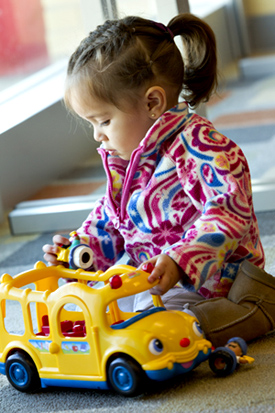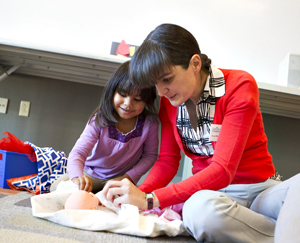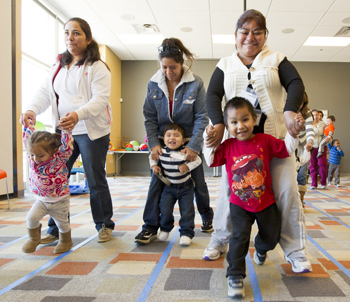Visit the Bachman Lake public library any Thursday morning and you’ll find boisterous infants and toddlers sprawled out on the carpet enjoying songs and toys while their parents learn how to help them play with a purpose.
The UT Dallas Center for Children and Families (CCF) is continuing to expand programs this summer in this west Dallas neighborhood designed to identify young children with development challenges and prepare them to succeed in school.

The Bachman Lake program gives young children a chance to learn as they play.
In fall 2010, the center began offering a developmental screening program for children from birth to 3 years old at the library branch, as well as neighborhood early education programs. With growing evidence of need and interest, CCF added an additional screening location in the neighborhood in the spring.
The center also invites parents in this mostly Hispanic neighborhood to attend developmentally based playtimes called “Juega Conmigo” with their young children up to 3 years of age. Classes take place every Thursday at the library and feature music, movement and various forms of experiential learning, including free-play time. Nutritionists and other professionals often attend the sessions to share information with parents.
The free program, which is conducted primarily in Spanish, is open to the public on a drop-in basis. Each week, about 20 to 30 children attend Juega. CCF staff members have screened 87 children since January.
Lyn Rodriguez Neisius, a clinical faculty member with CCF, oversees the effort, joined by staff members Dr. Ana-Maria Mata-Otero, Adriana Villa Baird and student interns from undergraduate and graduate programs in UT Dallas’ School of Behavioral and Brain Sciences (BBS). Neisius said word is spreading fast around the neighborhood and they are meeting with new families every week.
Parents bring their infants and toddlers for developmental screenings by appointment. Neisius first surveys the parents about developmental milestones, then evaluates the children with the Bayley Scales of Infant and Toddler Development Screening Test. The children are also observed in the Juega Conmigo classes to get an idea of their behavior in a semi-structured environment with peers.

Dr. Ana-Maria Mata-Otero, a CCF staff member, plays with a baby doll with one of her young visitors.
Families are provided immediate feedback at the time of the screening. They also receive a written report with referrals for follow-up services, if such needs are identified. They are also given developmental information and ideas for how to foster their children’s developing skills at home.
“What is so great about our program is that we have the opportunity to educate families about the latest findings in child development research as well as provide activities that parents can take home and expand on with their children. We also can catch needs for services very early in a child’s life and provide referrals,” Neisius said.
“The screenings we have conducted have identified a fairly large percentage of children with developmental delays and in need of services. By identifying these needs and providing other support for the parents with referrals and through our Juega Conmigo playtimes, we hope to help many children become ready to build academic success when they begin kindergarten,” she said.
Claudia Trevizo has brought her 20-month-old daughter, Isabella, to the Juega program for about three months. “This program is perfect for me,” she said. “The teachers are helping her to learn to play better and be ready for when she goes into school.”

Three mothers enjoy a chance to race around the library with their children.
CCF has partnered with other community-based agencies in the neighborhood such as Avance and Catholic Charities’ Together We Learn. By taking the screening and educational services directly to that area and partnering with local community organizations, UT Dallas is increasing the chance of identifying young children who need help.
“This makes a huge difference for families,” said Diana Muniz, the director of Avance’s Bachman Lake neighborhood Baby University program. “Not only to have someone explain what is going on with their child but also to follow-up with their child’s progress.”
Dr. Margaret Owen, director of the Center for Children and Families and Robinson Family Professor, said she hopes to work and provide training to groups serving similar communities.
“The experiences we’ve had with the children and their families in the Bachman Lake community, feedback we’ve received from the parents, and results we will gain from child outcome evaluations we’re gathering this summer are all contributing to programming ideas we are sharing with others,” she said.
The Bachman Lake program was funded in part by a gift from the Mike and Mary Terry Family Foundation.